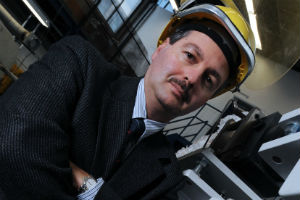A pilot scale study conducted by researchers at Brunel University London has affirmed that ultrasound treatment could be a much cheaper and more environmentally friendly way to remove hydrogen from aluminium alloys.

Aluminium alloys in a molten state at 700°C have a significant amount of hydrogen dissolved in them. If this is not treated, the resulting aluminium alloy would become highly porous on solidifying. Presently, argon rotary degassing is the primary method used for hydrogen removal. However, it is expensive and requires large amounts of energy. There is also a risk of contamination if the graphite impellers used in this process should break up.
Prof Dmitry Eskin of the Brunel Centre for Advanced Solidification Technology led a research project which discovered that using ultrasound was actually a preferable method, by a number of measures. Ultrasound processing uses less energy, produces less waste, and removes the most costly parts of the process, whilst achieving the same efficiency.
 Professor Dmitry Eskin
Professor Dmitry Eskin
The team performed the pilot study using samples of up to 150kg. The tests confirmed earlier findings that a moving ultrasound probe could provide similar results to the traditional argon rotary degassing.
They observed that using ultrasound led to a five-fold reduction in dross (waste material). Useable metal can be recovered from dross; however it requires electrolysis which is energy intensive and costly.
Prof Eskin’s research team now aims to find out ways to introduce ultrasound de-gassing in the earlier stages of the production process and also perform trials using larger quantities of up to half-tons.
Economic drivers like producing lighter engines and lighter car bodies are pushing process improvements in producing higher quality alloys much further back in the production cycle to where alloys are first smelted.
Ultrasound treatment holds out the promise of being able to de-gas effectively and continuously and we have already made some steps towards achieving this on the pilot level.
Prof. Dmitry Eskin
Sources and further reading